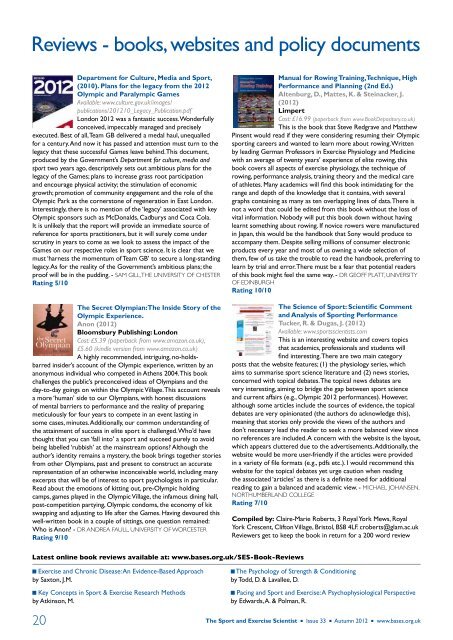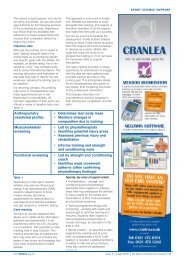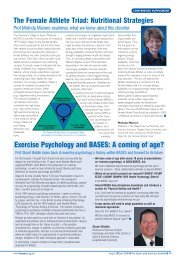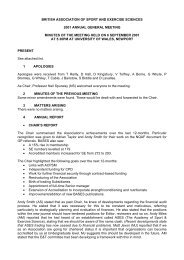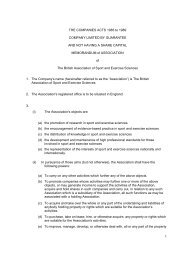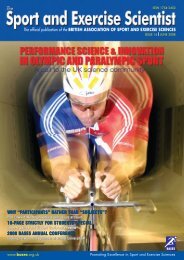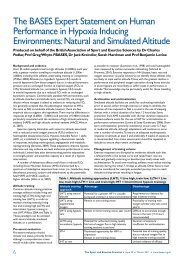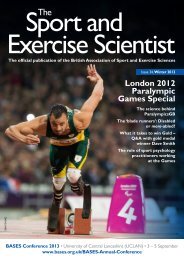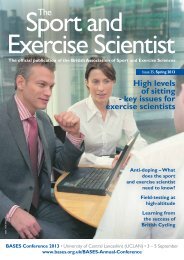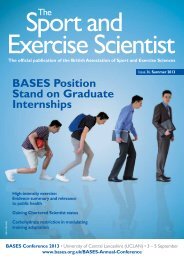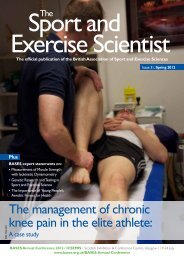Issue 33 Autumn 2012 - Bases
Issue 33 Autumn 2012 - Bases
Issue 33 Autumn 2012 - Bases
- No tags were found...
You also want an ePaper? Increase the reach of your titles
YUMPU automatically turns print PDFs into web optimized ePapers that Google loves.
Reviews - books, websites and policy documentsDepartment for Culture, Media and Sport,(2010). Plans for the legacy from the <strong>2012</strong>Olympic and Paralympic GamesAvailable: www.culture.gov.uk/images/publications/<strong>2012</strong>10_Legacy_Publication.pdfLondon <strong>2012</strong> was a fantastic success. Wonderfullyconceived, impeccably managed and preciselyexecuted. Best of all, Team GB delivered a medal haul, unequalledfor a century. And now it has passed and attention must turn to thelegacy that these successful Games leave behind. This document,produced by the Government’s Department for culture, media andsport two years ago, descriptively sets out ambitious plans for thelegacy of the Games; plans to increase grass root participationand encourage physical activity; the stimulation of economicgrowth; promotion of community engagement and the role of theOlympic Park as the cornerstone of regeneration in East London.Interestingly, there is no mention of the ‘legacy’ associated with keyOlympic sponsors such as McDonalds, Cadburys and Coca Cola.It is unlikely that the report will provide an immediate source ofreference for sports practitioners, but it will surely come underscrutiny in years to come as we look to assess the impact of theGames on our respective roles in sport science. It is clear that wemust ‘harness the momentum of Team GB’ to secure a long-standinglegacy. As for the reality of the Government’s ambitious plans; theproof will be in the pudding. - SAM GILL, THE UNIVERSITY OF CHESTERRating 5/10The Secret Olympian: The Inside Story of theOlympic Experience.Anon (<strong>2012</strong>)Bloomsbury Publishing: LondonCost: £5.39 (paperback from www.amazon.co.uk),£5.60 (kindle version from www.amazon.co.uk)A highly recommended, intriguing, no-holdsbarredinsider’s account of the Olympic experience, written by ananonymous individual who competed in Athens 2004. This bookchallenges the public’s preconceived ideas of Olympians and theday-to-day goings on within the Olympic Village. This account revealsa more ‘human’ side to our Olympians, with honest discussionsof mental barriers to performance and the reality of preparingmeticulously for four years to compete in an event lasting insome cases, minutes. Additionally, our common understanding ofthe attainment of success in elite sport is challenged. Who’d havethought that you can ‘fall into’ a sport and succeed purely to avoidbeing labelled ‘rubbish’ at the mainstream options? Although theauthor’s identity remains a mystery, the book brings together storiesfrom other Olympians, past and present to construct an accuraterepresentation of an otherwise inconceivable world, including manyexcerpts that will be of interest to sport psychologists in particular.Read about the emotions of kitting out, pre-Olympic holdingcamps, games played in the Olympic Village, the infamous dining hall,post-competition partying, Olympic condoms, the economy of kitswapping and adjusting to life after the Games. Having devoured thiswell-written book in a couple of sittings, one question remained:Who is Anon? - DR ANDREA FAULL, UNIVERSITY OF WORCESTERRating 9/10Manual for Rowing Training,Technique, HighPerformance and Planning (2nd Ed.)Altenburg, D., Mattes, K. & Steinacker, J.(<strong>2012</strong>)LimpertCost: £16.99 (paperback from www.BookDepository.co.uk)This is the book that Steve Redgrave and MatthewPinsent would read if they were considering resuming their Olympicsporting careers and wanted to learn more about rowing. Writtenby leading German Professors in Exercise Physiology and Medicinewith an average of twenty years’ experience of elite rowing, thisbook covers all aspects of exercise physiology, the technique ofrowing, performance analysis, training theory and the medical careof athletes. Many academics will find this book intimidating for therange and depth of the knowledge that it contains, with severalgraphs containing as many as ten overlapping lines of data. There isnot a word that could be edited from this book without the loss ofvital information. Nobody will put this book down without havinglearnt something about rowing. If novice rowers were manufacturedin Japan, this would be the handbook that Sony would produce toaccompany them. Despite selling millions of consumer electronicproducts every year and most of us owning a wide selection ofthem, few of us take the trouble to read the handbook, preferring tolearn by trial and error. There must be a fear that potential readersof this book might feel the same way. - DR GEOFF PLATT, UNIVERSITYOF EDINBURGHRating 10/10The Science of Sport: Scientific Commentand Analysis of Sporting PerformanceTucker, R. & Dugas, J. (<strong>2012</strong>)Available: www.sportsscientists.comThis is an interesting website and covers topicsthat academics, professionals and students willfind interesting. There are two main categoryposts that the website features; (1) the physiology series, whichaims to summarise sport science literature and (2) news stories,concerned with topical debates. The topical news debates arevery interesting, aiming to bridge the gap between sport scienceand current affairs (e.g., Olympic <strong>2012</strong> performances). However,although some articles include the sources of evidence, the topicaldebates are very opinionated (the authors do acknowledge this),meaning that stories only provide the views of the authors anddon’t necessary lead the reader to seek a more balanced view sinceno references are included. A concern with the website is the layout,which appears cluttered due to the advertisements. Additionally, thewebsite would be more user-friendly if the articles were providedin a variety of file formats (e.g., pdfs etc.). I would recommend thiswebsite for the topical debates yet urge caution when readingthe associated ‘articles’ as there is a definite need for additionalreading to gain a balanced and academic view. - MICHAEL JOHANSEN,NORTHUMBERLAND COLLEGERating 7/10Compiled by: Claire-Marie Roberts, 3 Royal York Mews, RoyalYork Crescent, Clifton Village, Bristol, BS8 4LF. croberts@glam.ac.ukReviewers get to keep the book in return for a 200 word reviewLatest online book reviews available at: www.bases.org.uk/SES-Book-ReviewsExercise and Chronic Disease: An Evidence-Based Approachby Saxton, J.M.Key Concepts in Sport & Exercise Research Methodsby Atkinson, M.The Psychology of Strength & Conditioningby Todd, D. & Lavallee, D.Pacing and Sport and Exercise: A Psychophysiological Perspectiveby Edwards, A. & Polman, R.20 The Sport and Exercise Scientist n <strong>Issue</strong> <strong>33</strong> n <strong>Autumn</strong> <strong>2012</strong> n www.bases.org.uk


